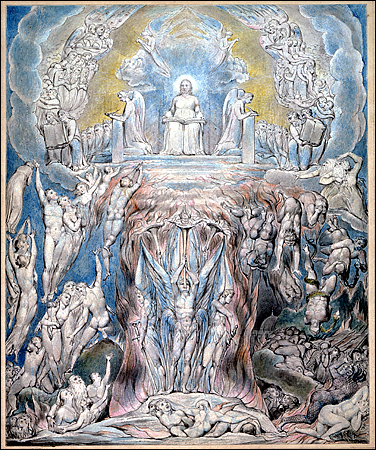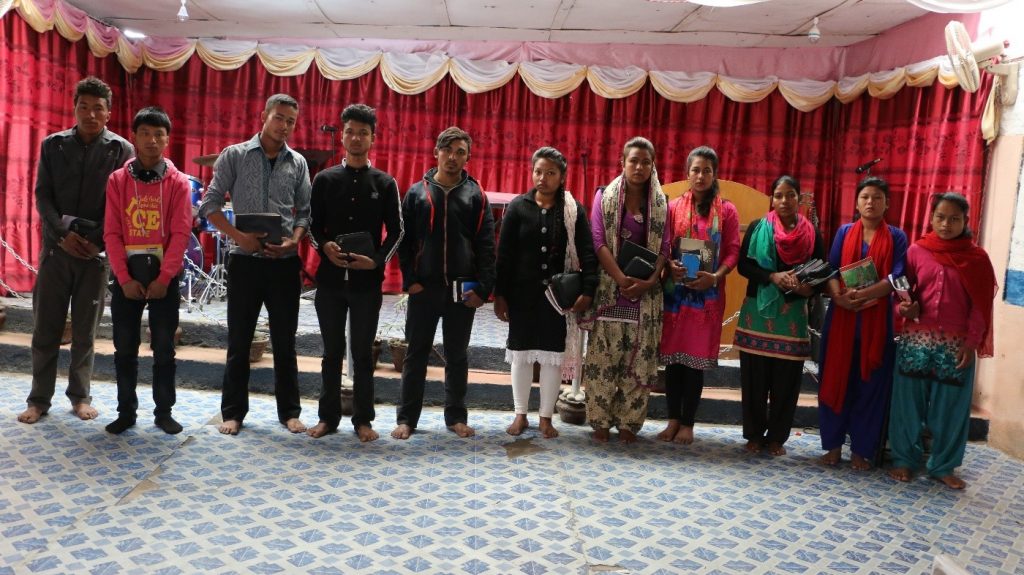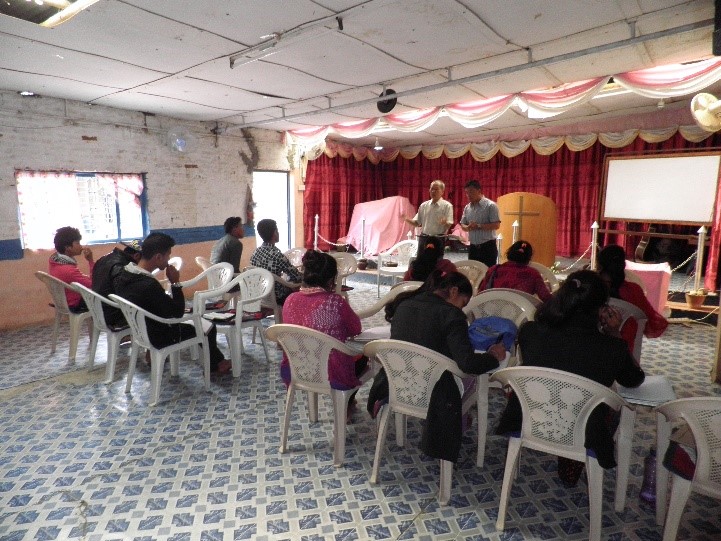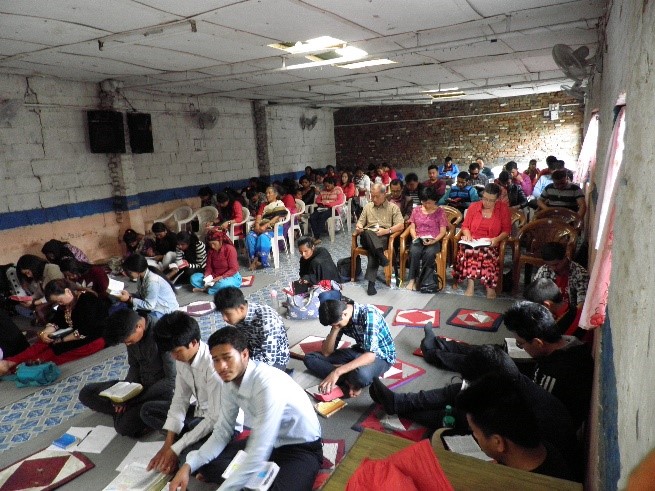Dear Brothers and Sisters,

Searching for something to listen to as I drove home, I landed on a Christian radio station where a preacher made this proclamation: “The gospel is good news only if it’s not too late!” Seeking to motivate Christians to evangelize their neighbors, friends and family who have not yet accepted Jesus as Lord and Savior, his underlying message was clear: “You must share the gospel before it’s too late!” Though that viewpoint is shared by many (though not all) evangelical Protestants, other viewpoints have been espoused by orthodox Christians both today and in the past. I’ll briefly review some of those viewpoints here, concluding that we don’t need to know exactly how and when God brings people to receive his salvation in order to actively participate today in the Holy Spirit’s ongoing work of evangelism.
Restrictivism
The preacher I heard on the radio holds a perspective on evangelism (and salvation) sometimes referred to as restrictivism. That viewpoint asserts that if a person has not explicitly and consciously accepted Jesus Christ as Lord and Savior before they die, their opportunity for salvation has ended; for them, God’s grace has run out. Restrictivism thus teaches that death is somehow stronger than God—like a pair of “cosmic handcuffs” it restrains God from saving people when they (even through no fault of their own) have failed to explicitly declare Jesus Christ as Lord and Savior before death. According to restrictivism, lacking the exercise of conscious faith that names Jesus as Lord and Savior before death even seals the fate of 1) those who die without hearing the gospel, 2) those who die having embraced a faulty gospel, and 3) those who die after a life of mental disability that kept them from understanding the gospel. By placing such severe conditional limits on who does and who does not enter salvation, restrictivism raises perplexing and provocative questions.

(public domain via Wikimedia Commons)
Inclusivism
Another viewpoint on evangelism held by many Christians is known as inclusivism. This viewpoint, which sees the Bible as authoritative, understands salvation as being possible only through Jesus Christ. Within inclusivism there are multiple perspectives concerning the fate of those who have not made an explicit profession of faith in Jesus before they die. That diversity has existed throughout church history. Justin Martyr in the second century and C.S. Lewis in the twentieth century both taught that though God saves people only because of the work of Christ, a person may be saved even if they do not know about Christ so long as they have an “implicit faith” that results from God’s grace being active in their life by the Holy Spirit. They both taught that “implicit” faith then becomes “explicit” when God provides the circumstances that allow the person to understand who Christ is and how God, by grace, has provided for their salvation through Christ.
Postmortem evangelism
Another viewpoint (within the camp of inclusivism) involves belief in what is referred to as postmortem evangelization. This viewpoint asserts that people who die unevangelized can still receive God’s salvation following death. This perspective was espoused in the late second century by Clement of Alexandria and made popular in our day by theologian Gabriel Fackre (born 1926). Theologian Donald Bloesch (born 1928) also taught that if someone has not had any opportunity in this life to know Christ and put their trust in him, God will give them that opportunity when they appear before Christ following death.
Universalism
Some Christians hold to a viewpoint known as universalism. It teaches that (in one way or another) everyone necessarily will be saved, regardless of whether they are good or bad, have repented or not, or have put their faith in Jesus as Savior or not. This deterministic perspective says that, in the end, all souls (whether human, angelic or demonic) will be saved by God’s grace, making the response of the individual to God of no consequence. This viewpoint apparently arose with the Christian leader Origen in the second century and various versions have been espoused since then. Some (but not all) versions of universalism repudiate Jesus as Savior and regard one’s response to God’s free gift as irrelevant. The idea that one can repudiate grace, reject the Savior, yet still enter into salvation is repugnant to most Christians. GCI does not consider such versions of universalism as biblical.
What does GCI believe?
There are many other viewpoints held by Christians concerning evangelism and the related topic of the how and when of salvation. Some believe God will give all people multiple “chances” before death sufficient to enable them to have at least an implicit faith in Christ. Others believe God will ultimately save the vast majority of humans, though they do not try to explain the how or when. What does GCI believe? As with all doctrinal matters, our commitment is to begin with the truth revealed in Holy Scripture. There we find that God has reconciled all humanity to himself through the life, death, resurrection and ascension of his incarnate Son, Jesus Christ (2 Corinthians 5:19). Concerning that work of reconciliation, Jesus, dying on the cross, declared “It is finished!”
Thus we know from biblical revelation that whatever happens to people in the end, it will not be due to any deficiency in the motive, mind and purpose of God. Our Triune God has done everything possible to save every person from the terrible and horrific condition known as “hell.” The Father has given us his one and only Son to be our representative and substitute, standing in for us as our High Priest. The Holy Spirit now works to draw each person so that they may share in all the benefits held for them in Christ. This is what we know and believe. But there is much we do not know and we must be careful not to draw conclusions (not make “logical inferences”) beyond what we are given to know for sure.
For example we must not presume upon the grace of God by dogmatically declaring a universalistic perspective that God, in saving all people, will violate the deliberate choice of some who willfully and persistently reject his love, turning away from him and repudiating his Spirit. While it is hard to believe that anyone would make a choice like that, if we are to be faithful to Scripture (with its numerous warnings against resisting the Word and Spirit), we must acknowledge that some may, in the end, reject God and his love. The important thing to remember here is that such a rejection is their choice—it is not their destiny. As C. S. Lewis shrewdly observed, “The doors of hell are locked from the inside.” In other words, hell is where you have to eternally resist the love and grace of God. Even though we cannot say for certain that all humans will ultimately accept God’s grace, we can hope that will be the case. And that hope aligns with what God desires, that none perish but all reach repentance. Certainly we can and ought to hope for no less and we should join with the Spirit as he works to lead people to repentance.
As we’ve shared many times, the love of God and the wrath of God are not symmetrical opposites; they are not opposed to one another. God is against everything that is against his good purposes to reconcile and redeem his beloved creation. In other words, God opposes anything that opposes his good, loving purposes. God would not be loving if he did not do so. God hates sin because it is resistance against his love and good purposes for humanity. His wrath is thus an aspect of his love—God resists our resistance. In his grace, motivated by his love, God not only forgives us, he also disciplines and transforms us.
We must not put a limit on God’s grace. Yes, there is the real possibility that some will choose to eternally resist God’s loving and forgiving grace, but that will not be because God has changed his mind about them—his mind has been made up in Jesus Christ. I love the way our good friend Gary Deddo explains this reality:
We are living, as Paul says, living up into Christ, because we really belong to him. We belong first, and then we believe that we belong, and then, as we’re believing we’re belonging, we’re going to be living up into it. The Holy Spirit is the power within us enabling us to live more and more fully and freely as the children—the reconciled children of God that we really are. We’re living into a reality, we’re not creating a new reality—that’s been done in Christ—we’re living up into the reality. Although there are those who are resisting the reality, nobody is going to change it. We either affirm the reality or live in denial of the reality—that’s the nature of our choice. Sometimes we think our choice is to create an alternative reality. No, that would make us God. We’re not. Our only choice, and the choice that God gives and enables us by his Spirit to make, is to live in the reality that God has established and created for us, out of his goodness, holiness, mercy and grace. (Quoted from “Those Who Never Heard the Gospel” at www.gci.org/yi/deddo27)
Looking through the lens of Jesus
Because salvation, being personal and relational, involves God and persons in relationship, in thinking about God’s judgment we must not assume or impose limitations on God’s desire for relationship. The purpose of God’s judgment is always to save—it is for relationship. Through his judgment God sorts out what needs to be eliminated (condemned) so that a person can experience relationship (union and communion) with him. Thus we believe that God judges so that the sin and evil is condemned, but the sinner is saved and forgiven. He separates us from sin “as far as the east is from the west.” Like the scapegoat of ancient Israel, God sends our sin away into the wilderness so that we might live a new life in Christ.
God’s judgment sanctifies, burns away, purifies in Christ to save the person being judged. God’s judgment is thus a sorting or sifting—a separation of what is right from what is wrong, what is against you and what is for you, what leads to life and what doesn’t. To understand both the nature of salvation and of judgment, we must read Scripture, not through the lens of our own experience, but through the lens of the person and work of Jesus our holy, loving Savior and Judge. With that in mind, consider these questions and their obvious answers:
- Is God limited in his grace? NO!
- Is he handcuffed (stymied) by time and space? NO!
- Does God have to work within physical constraints like humans do? NO!
- Is he limited by our lack of consciousness? NO!
- Is he the Lord of time? YES!
- Can he squeeze into our time as many opportunities as he wants to open us to grace by his Spirit? CERTAINLY!
Knowing that we are limited and that God is not, we must not project our limitations upon a Father who perfectly and completely knows our hearts. We can count on him to be faithful, even if we do not have a final theory as to exactly how his faithfulness and grace will be exemplified in the life of each person both in this life and the next. We do know this: in the end no one will say, “God, if you had only been a little more gracious… so-and-so would have received your salvation.” We will all find God’s grace to be more than sufficient.
The good news is that the free gift of salvation for all humans relies entirely on Jesus’ acceptance of us—not on our acceptance of him. Because “all who call upon the name of the Lord will be saved,” there is no reason for us not to receive his gift of eternal life and live by his Word and in the Spirit who the Father sends to us so that, today, we might share fully in the life of Christ. There is thus every reason for Christians to do the good work of evangelism—to participate actively in what the Holy Spirit is doing to lead people to repentance and faith.
Loving the knowledge that Jesus both accepts and qualifies us,
Joseph Tkach




